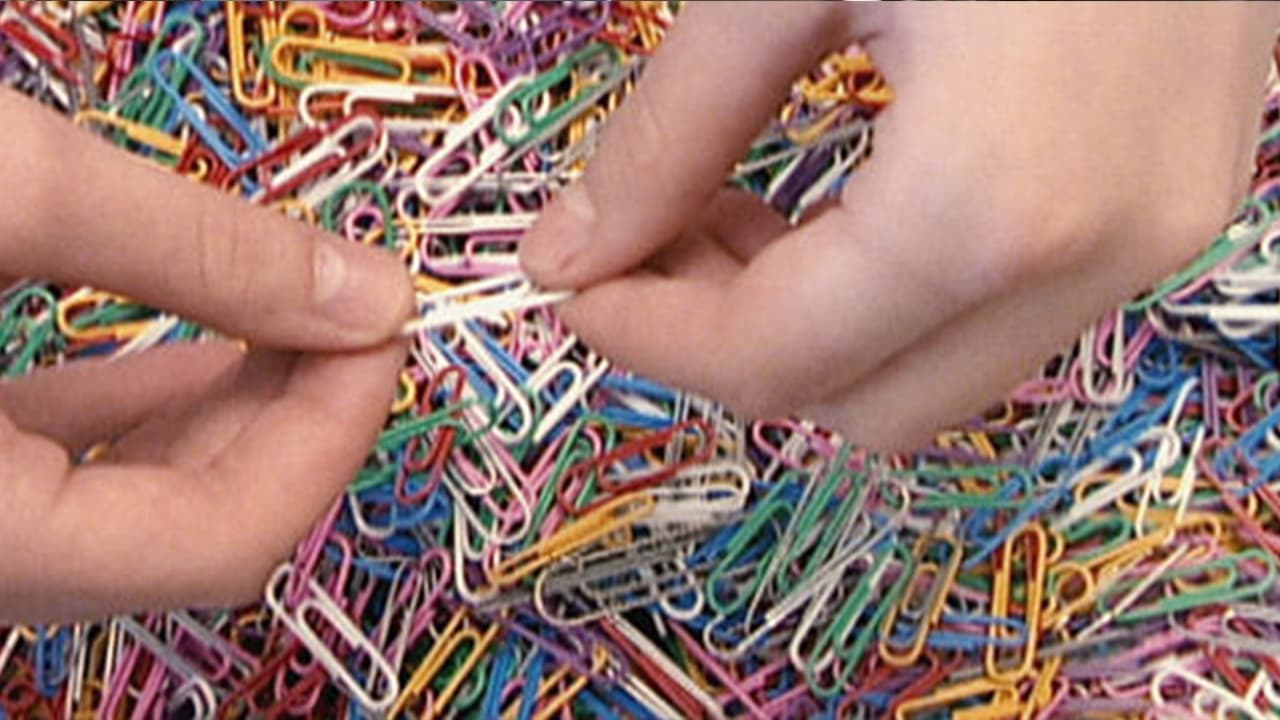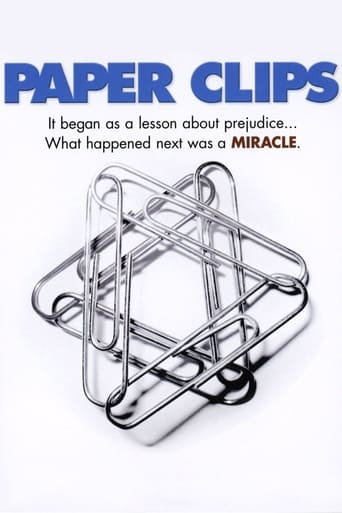

11 million people died in the Holocaust but it seems like they only care about the Jewish people. At one point the teacher does mention the other 5 million people but it seems like she really didn't care about them. Since they got enough paper clips, the teacher makes it sounds like "well I guess we'll include the other 5 million". If these people didn't talk so damn slow they could've wrapped this movie up in 30 minutes.I really can not believe how everyone kept saying "the 6 million people" no one ever said "there were 11 million people who died". That is unbelievable and disappointing.
... View MoreEveryone who participated in the paper clip project at Whitwell Middle School is to be commended--the students, teachers, administrators, and many other volunteers. However, the movie pitches their efforts in a way that is too self-congratulatory, and this detracts from this otherwise wonderful story. The movie tries too hard--from the theme music to the frequent footage of participants tearing up--to make the case for a "miracle" in this small Tennessee town. A more objective and unemotional presentation would have let the events speak for themselves. As it was, I really wanted to like all of the participants, but I found the syrupy presentation almost constantly getting in the way. Rather than being a movie about the enduring significance of the Holocaust and its relevance for people even in very distant places, it became a movie about how darn great the whole paper clip project was and how special its participants were. So, great idea--I really mean that--but flawed execution.To those who say they are tired of "only Jews" being pointed out as victims of genocide: reformulate your criticism. There cannot be too much about the Jews being exterminated. The problem is that other genocides don't get enough press, not that the Jewish Holocaust has received too much. But this isn't the fault of those who pay attention to Jewish suffering. The presumption that there is some sort of competition among genocides, a zero-sum game for genocide coverage (as if there were some set amount of coverage to be carved up) is ludicrous. In general, we need to pay more attention to the atrocities people have committed and continue to commit against each other. So it's "both/and" not "either/or." There should be paper-clip-type projects in schools throughout the world to remember the victims and survivors of other slaughters in modern history as well as the Holocaust (NOT "instead of" the Holocaust). What about the Atlantic slave trade's Middle Passage, the Congo Free State, the WWI Armenian genocide, Ukrainian mass starvation in the 1930's, Cambodian killing fields in the 70's, Rwandan genocide, Bosnia, Darfur? I agree with those who criticize the tendency to turn a blind eye to American atrocities, but don't ever allow this to lead you to dismiss the importance of mass killing. Stick to the principle that mass killing is evil regardless of who commits or enables it, and you won't go wrong.
... View MoreI've never felt compelled to review a film on IMDb before, but in light of the uncritical adulation expressed by other viewers, I feel it would be irresponsible not to offer a counterpoint. "Paper Clips" is a deeply flawed, shallow wreck of a documentary that does a disservice to its audience, subject, and history.First, let me state that this is a review of the film, not the project it chronicles (although the film-makers don't really bother to distinguish between the two.) I'm not interested in debating the pedagogical merit of Whitwell Middle's Holocaust program. Likewise, I am in no way suggesting that we ought not to remember the Holocaust.A film of numerous faults, the over-riding flaw of "Paper Clips" is its failure to maintain a critical distance from its subject matter. Great documentaries in some way challenge our assumptions of ourselves and the world we live in. Biases, passions, and agendas can be gracefully incorporated, but a degree of scrutiny and objectivity must be maintained. "Paper Clips" never digs below the surface, looks for a deeper meaning behind its narrative, or suggests that the audience should take the words and actions of the students and teachers involved as anything but truth. Instead, it relies on musical cues, vague clichés about "tolerance" and "prejudice," and a bullet-proof morality (who would say anything bad about children learning about the Holocaust?) as it plods through a nonsensical feature length.It's not that "Paper Clips" fails at digging beneath the human interest surface, it doesn't even make an effort. The town of Whitwell and its people are the stuff of potentially powerful films- a deindustrializing Appalachian town dealing (or not) with its past demons of provincial prejudice, while facing an uncertain economic future. Instead, what we are coerced to accept is a regurgitation of hackneyed ideas of rural people as "just plain folks" with good old fashioned morals and hospitality. The very real legacy of racism and the current anti-immigrant hysteria in the South are left unexplored. Likewise, complex philosophical and ethical issues of historical memory and symbolic appropriation are ignored in favor of a "feel good" infomercial approach. The testimonies of Holocaust survivors are presented more for requisite tear-jerking and to demonstrate the golden hearts of the protagonists, it seems. Self-congratulation drowns out any discussion of the contested legacy of the Holocaust- who can speak for the victims, or how it is utilized for symbolic righteousness by contending groups (like, perhaps, the rural Southerners in the film who conflate "redneck" stereotypes with organized anti-Semitic campaigns of violence.) This, combined with clunky editing and an aesthetic somewhere between a country music video and a 700 Club feature, left me squirming in my seat.In his seminal work "The Society of the Spectacle," Guy Debord describes a contemporary society in which one's understanding of reality and history has been obscured by a barrage of abstracted symbols and images in the interests of spectacular consumption. Value can perhaps be found in "Paper Clips" as a sad comment on how close we are to such a vision. Essentially a socially conservative and politically liberal film, "Paper Clips" refuses to examine below the surface, plumbing for the social and economic causes of genocide, hatred, and ignorance, thereby effectively precluding even the remotest exploration of radical social change or critique. Intolerance, we are informed, is overcome by turning students into mini-bureaucrats managing spurious symbolic gestures. Evil and injustice are simple to understand and correct in the Disneyfied world of "Paper Clips"- no analysis needed! The film-makers merely add one more layer of confusion and alienation with their stubborn refusal to acknowledge a complex and troubling world. To let this film off the hook as just a simple story of hope or some such nonsense, is to insult and degrade its subjects, audience, and historical remembrance.
... View MoreThis should be required viewing for all students from middle school through high school. An excellent documentary - educational, moving, and inspiring. A must-see, not only for students, but for all. The story of the paper clip project itself is fascinating but the effect it had on the people of this small town and the world is what really makes the movie interesting. The personal stories of the people who contributed to the project are extremely moving, particularly the Holocaust survivors who visited the town to tell their stories to the students in person. This is one of the most moving movies I have ever seen, and despite the haunting nature of the subject content, is very uplifting and hopeful. A wonderful documentary.
... View More